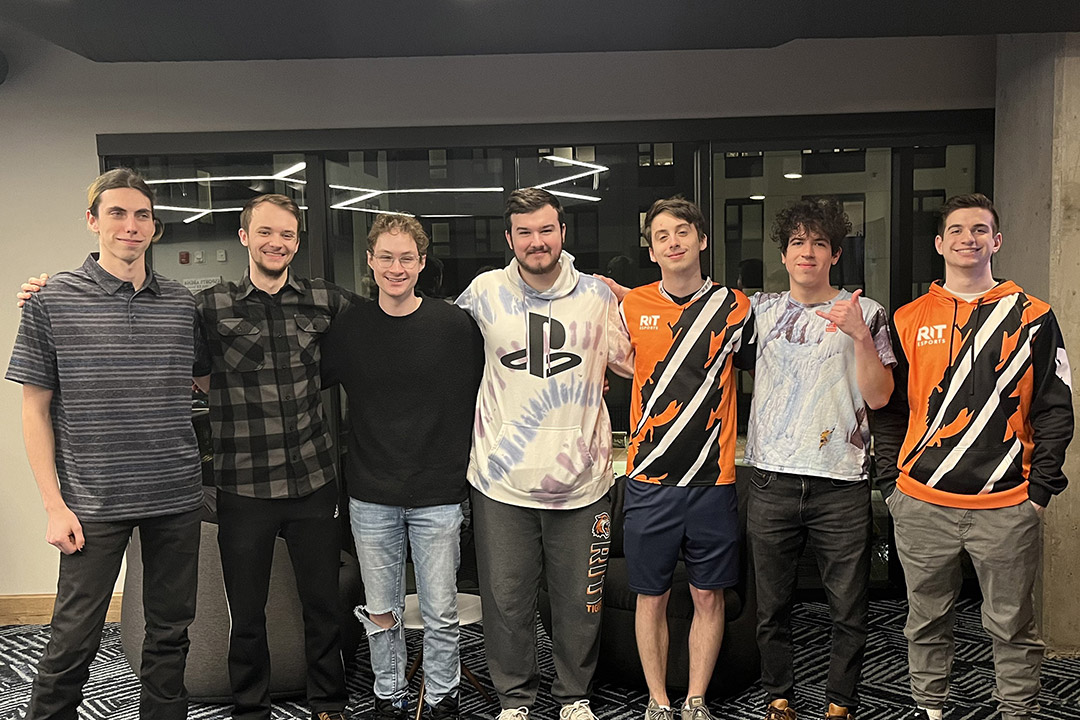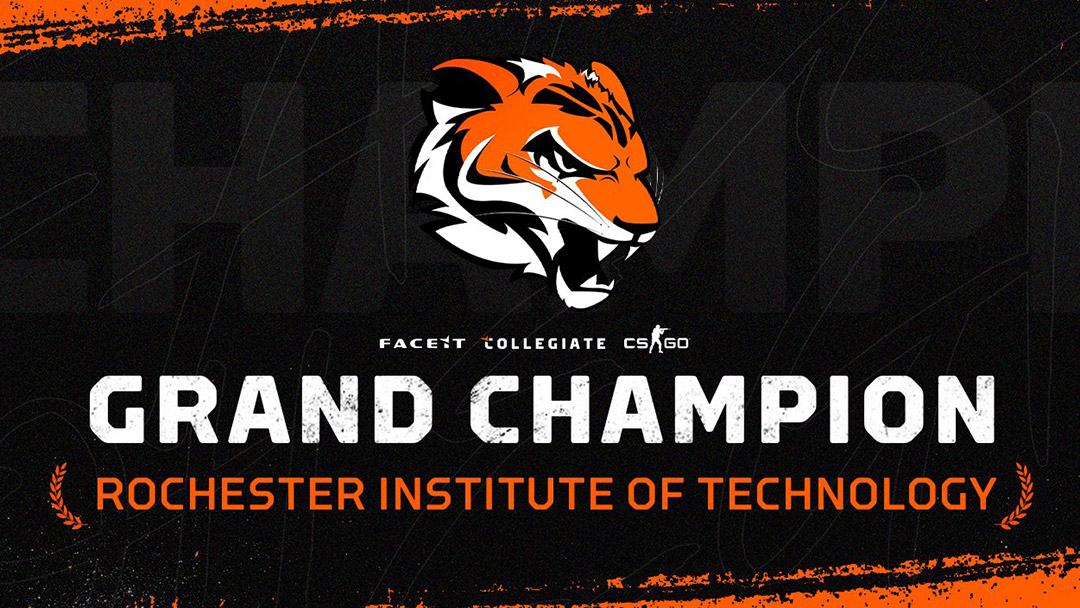RIT Esports wins FACEIT’s North American ‘CS:GO’ Collegiate Championship
Students win $5,000 in spring 2022 ‘Counter-Strike: Global Offensive’ esports tournament
RIT Esports students Will "Lucy" Carroll (left), Aidan Wood, Omar Dajani, Kyle Jacowleff, Matt Bussell, Logan D’Auria, and Brian Mirabito won the 2022 North American FACEIT CS:GO Collegiate Grand Championship.
RIT Esports dominated the FACEIT Grand Finals tournament to become the best collegiate CS:GO team in North America this spring.
The Tigers bested 68 teams to win the 2022 FACEIT championship, which is one of the main tournaments for collegiate Counter-Strike: Global Offensive (CS:GO) esports. The RIT students won $5,000 in scholarships for playing the game. This is the university’s first national championship for the game CS:GO.
During the regular season, RIT had only one loss to an undefeated team from University of Texas at Austin. In the playoffs, RIT beat University of Southern Florida, Clemson University, Northeastern University, and University of Central Florida to advance to the finals.
RIT ultimately took down University of Texas at Austin 3-0 to win the championship on April 23. The team won 16-7 in the Inferno map, 16-8 on the Overpass map, and 16-9 on the Mirage map. A video of the match is available to watch on Twitch.
The RIT CS:GO team included:
- Kyle Jacowleff, a third-year computer engineering major from Clinton, N.J.;
- Logan D’Auria, a fifth-year computer science major from Burlington, Mass.;
- Aidan Wood, a fifth-year industrial engineering major from Mendham, N.J.;
- Will "Lucy" Carroll, a fifth-year electrical mechanical engineering technology major from Kinderhook, N.Y.;
- Omar Dajani, a fifth-year software engineering major from Rochester, N.Y.;
- Team manager Brian Mirabito, a fifth-year software engineering major from Camillus, N.Y.;
- Team coach Matt Bussell, a third-year computing security major from Westchester, N.Y.
“I think what led to us being successful was the longevity of the roster,” said Bussell. “The fact the core of the lineup had been together for so long led to good team chemistry, as well as building upon past mistakes and triumphs.”
The RIT team lost last year in the 2021 Grand Finals. Dajani stepped into the roster at the start of the year, as the team worked to make it back to the finals before most of the team graduated.
This semester, the team also placed fourth out of 49 teams in the National Association of Collegiate Esports (NACE) spring Varsity League—winning them an additional $1,000.
“I enjoy collegiate esports for the team environment, the community, and the competition,” said Bussell. “Over the past few years, I have been able to meet a lot of great people both at RIT and all across the nation at these other schools.”
At this year’s FACEIT tournament, a second team of RIT students made it to the quarterfinal round.
“Two teams from the same school making it to the top eight really cements your program as one of the most dominant, if not the most dominant, in the collegiate scene currently,” said Nate “Pineapple Philips” Jensen, the caster for the finals on Twitch.
CS:GO is a multiplayer, first-person shooter game that pits two teams of five players against each other, with each team having to complete certain objectives to win. Winning requires extensive teamwork, strategy, map selection, and good reflexes.
RIT Esports currently has more than 250 students playing in 18 different competitive esports. The university has won seven national championships in the games Hearthstone, Dota 2, Dropzone, PlayerUnknown’s Battlegrounds, and CS:GO. RIT even has an esports lounge on campus for competitions and practice.
On the academic side, RIT is a leader in the field of video game design and development, offering a master’s degree and a bachelor’s degree. The university is ranked one of the top schools in the world to study video game design, according to international rankings from The Princeton Review.








